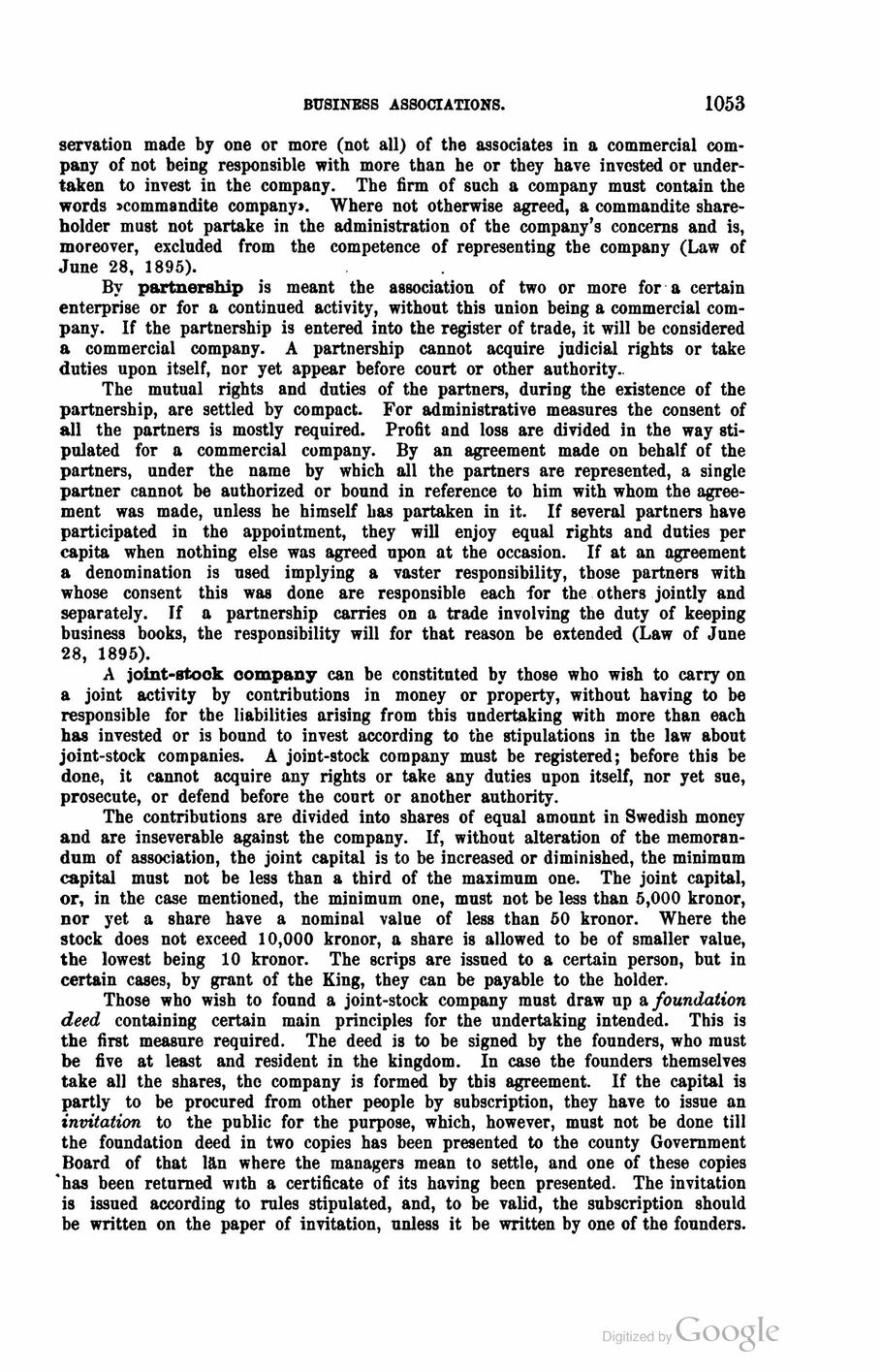
Full resolution (JPEG) - On this page / på denna sida - Second part - XV. Synopsis of Industrial Legislation. By A. Berencreutz, Chamberlain, Swedish-Norwegian Consul General, Copenhagen - Business Associations

<< prev. page << föreg. sida << >> nästa sida >> next page >>
Below is the raw OCR text
from the above scanned image.
Do you see an error? Proofread the page now!
Här nedan syns maskintolkade texten från faksimilbilden ovan.
Ser du något fel? Korrekturläs sidan nu!
This page has never been proofread. / Denna sida har aldrig korrekturlästs.
BUSINESS ASSOCIATIONS.
1053
servation made by one or more (not all) of the associates in a commercial
company of not being responsible with more than he or they have invested or
undertaken to invest in the company. The firm of such a company must contain the
words »commandite company». Where not otherwise agreed, a commandite
shareholder must not partake in the administration of the company’s concerns and is,
moreover, excluded from the competence of representing the company (Law of
June 28, 1895).
By partnership is meant the association of two or more for a certain
enterprise or for a continued activity, without this union being a commercial
company. If the partnership is entered into the register of trade, it will be considered
a commercial company. A partnership cannot acquire judicial rights or take
duties upon itself, nor yet appear before court or other authority.
The mutual rights and duties of the partners, during the existence of the
partnership, are settled by compact. For administrative measures the consent of
all the partners is mostly required. Profit and loss are divided in the way
stipulated for a commercial company. By an agreement made on behalf of the
partners, under the name by which all the partners are represented, a single
partner cannot be authorized or bound in reference to him with whom the
agreement was made, unless he himself has partaken in it. If several partners have
participated in the appointment, they will enjoy equal rights and duties per
capita when nothing else was agreed upon at the occasion. If at an agreement
a denomination is used implying a vaster responsibility, those partners with
whose consent this was done are responsible each for the others jointly and
separately. If a partnership carries on a trade involving the duty of keeping
business books, the responsibility will for that reason be extended (Law of June
28, 1895).
A joint-stock company can be constituted by those who wish to carry on
a joint activity by contributions in money or property, without having to be
responsible for the liabilities arising from this undertaking with more than each
has invested or is bound to invest according to the stipulations in the law about
joint-stock companies. A joint-stock company must be registered; before this be
done, it cannot acquire any rights or take any duties upon itself, nor yet sue,
prosecute, or defend before the court or another authority.
The contributions are divided into shares of equal amount in Swedish money
and are inseverable against the company. If, without alteration of the
memorandum of association, the joint capital is to be increased or diminished, the minimum
capital must not be less than a third of the maximum one. The joint capital,
or, in the case mentioned, the minimum one, must not be less than 5,000 kronor,
nor yet a share have a nominal value of less than 50 kronor. Where the
stock does not exceed 10,000 kronor, a share is allowed to be of smaller value,
the lowest being 10 kronor. The scrips are issued to a certain person, but in
certain cases, by grant of the King, they can be payable to the holder.
Those who wish to found a joint-stock company must draw up & foundation
deed containing certain main principles for the undertaking intended. This is
the first measure required. The deed is to be signed by the founders, who must
be five at least and resident in the kingdom. In case the founders themselves
take all the shares, the company is formed by this agreement. If the capital is
partly to be procured from other people by subscription, they have to issue an
invitation to the public for the purpose, which, however, must not be done till
the foundation deed in two copies has been presented to the county Government
Board of that län where the managers mean to settle, and one of these copies
"has been returned with a certificate of its having been presented. The invitation
is issued according to rules stipulated, and, to be valid, the subscription should
be written on the paper of invitation, unless it be written by one of the founders.
<< prev. page << föreg. sida << >> nästa sida >> next page >>